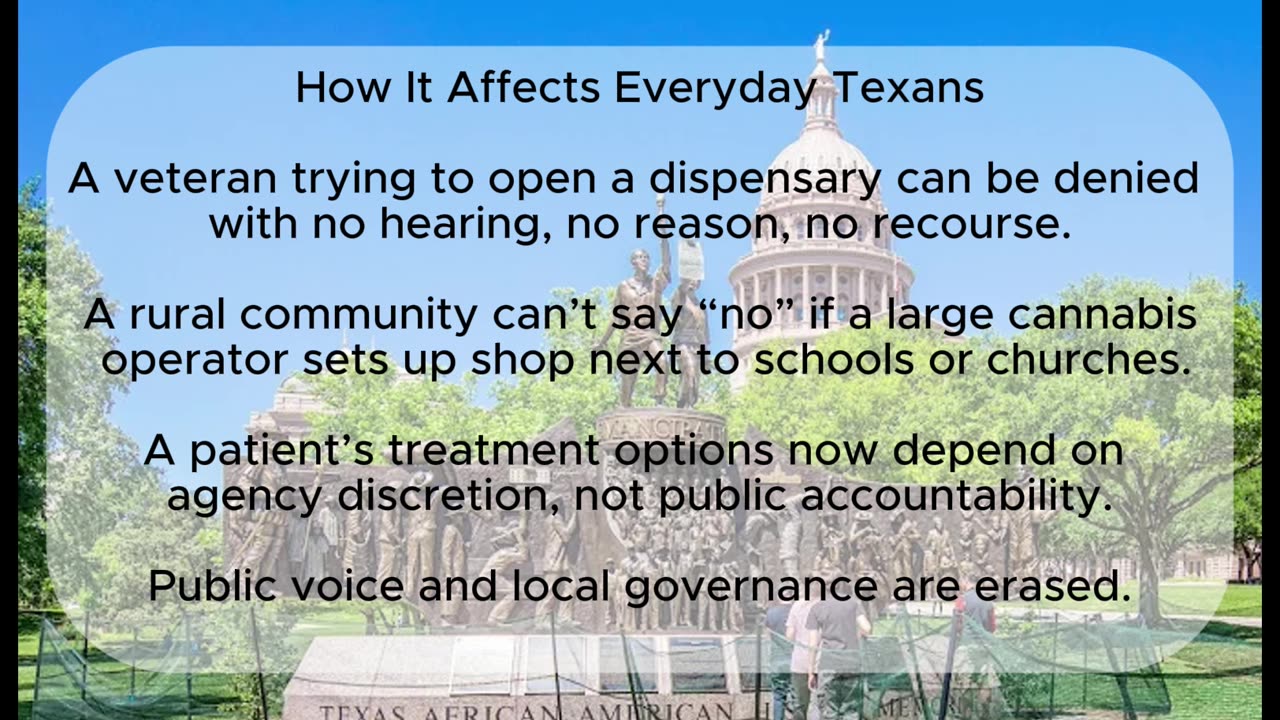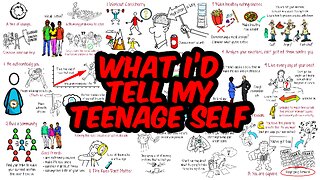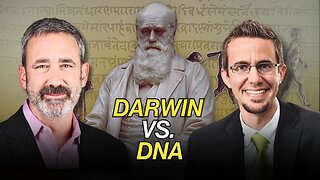Premium Only Content

"HB 46 – It Sounds Like Compassion, But Look Closer
A lot of folks are celebrating HB 46 as a win for veterans and people in pain. On the surface, it looks like progress—and in some ways, it is. But the way this thing is structured? It’s setting us up for a different kind of problem down the line.
What the bill claims to do
HB 46 expands Texas’s Compassionate Use Program. More patients can qualify, including those with PTSD, chronic pain, and other real conditions. It allows more medical cannabis providers to operate and even makes it legal to use inhalers or vaporizers instead of oils or pills.
Why that sounds good
This bill gives people options—especially veterans—outside of opioids and the pharmaceutical treadmill. That’s a good thing. Texans deserve relief that doesn’t come with a bottle full of side effects. And if you’ve seen what cannabis can do for epilepsy or chronic pain, you know it can change lives.
But here’s what it really changes
The part they’re not talking about is how this bill shifts control—quietly, and permanently.
If you apply for a license and get denied, you don’t get a hearing. That’s it. No appeal. No second look.
DPS and DSHS now have the power to decide who gets in and who gets shut out, and they don’t have to explain any of it publicly.
Cities and counties? They’re not allowed to say no to dispensaries—even if local residents want tighter controls.
And once the bill’s passed, these agencies can keep rewriting the rules—about who qualifies, what’s allowed, and who’s off-limits—without ever going back to the legislature or the people.
This isn’t about access. It’s about control.
Who stands to gain
Companies like Texas Original, Goodblend, and Blissful CannaCo supported the bill. They’re already licensed, and this gives them a chance to grow fast—open satellite locations, grab more territory, and do it without competition from smaller players. Meanwhile, the state pockets over $7 million in license fees, all without building any real transparency into how those licenses are handed out.
And who gets left out
Let’s say you’re a vet trying to open a dispensary yourself. You can be denied and won’t even be told why—and there’s nothing you can do about it.
Or maybe you live in a small town and want some say in where cannabis shops open. Too bad—local control is gone.
Even if you’re just a patient hoping to get more options? Whether that happens or not depends entirely on two state agencies, behind closed doors.
What this sets up
Once you give agencies this kind of unchecked authority, it doesn’t stop with cannabis. Education, healthcare, business licensing—this bill sets the blueprint. Let unelected people make the rules. Cut out the courts. Silence local voices. And call it “compassion.”
Something about this feels off
I’m not a lawyer, but if the state can deny your license and block you from challenging it, that sounds like a due process problem. And banning cities from having any say in what opens in their own backyard? That’s not the Texas I know.
Bottom line
Do I believe in medical cannabis? Absolutely. I believe in helping veterans, chronic pain patients, and families stuck between suffering and Big Pharma.
But I also believe in fairness. In transparency. In the right to speak up and be heard.
HB 46 says the right things. But it’s designed to shut the door behind the people already inside.
Keep your eyes open. If we don’t push back now, this kind of lawmaking will become the new normal. Quiet, concentrated, and completely unaccountable.
Let’s fight for the people and the process. Both matter."
-
 18:11
18:11
Tactical Considerations
14 hours ago $0.36 earnedIs This the Best Truck Gun for 2025?
2.32K3 -
 8:37
8:37
The Art of Improvement
19 hours ago $0.52 earnedLife Lessons I’d Tell My Teenage Self
4.06K -
 LIVE
LIVE
BEK TV
22 hours agoTrent Loos in the Morning - 9/19/2025
192 watching -
 17:22
17:22
Adam Does Movies
12 hours ago $1.54 earnedIce Road: Vengeance - Movie Review
59.5K4 -
 45:05
45:05
Uncommon Sense In Current Times
16 hours ago $0.55 earnedDarwin vs. DNA | Dr. Nathaniel Jeanson on Creation Science, Evolution & the Case for Genesis
12.1K2 -
 32:19
32:19
The Lou Holtz Show
13 hours agoThe Lou Holtz Show S2 EP18 | Danica Patrick on Fearlessness, Faith & Finding Purpose #podcast
11.6K4 -
 23:41
23:41
The Official Corbett Report Rumble Channel
10 hours agoDiscord Democracy is Coming For Us All! - New World Next Week
8.01K12 -
 49:14
49:14
CharLee Simons presents DO NOT TALK
1 day agoSCREW YOU, ZUCKERBERG (Sam Anthony is back!)
11.5K1 -
 1:04:26
1:04:26
SinCityCrypto
18 hours ago $0.70 earnedAltcoins About to EXPLODE (ETF Approvals)
9.4K1 -
 LIVE
LIVE
Times Now World
2 days agoLIVE | Putin in Military Gear Leads Massive Zapad 2025 Drills With 100,000 Troops | TIMES NOW WORLD
645 watching